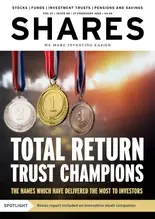
Equity markets went into reverse again on Thursday, despite new ceasefire talks between Russia and Ukraine, as oil prices neared $120 a barrel.
Russian forces have taken the Black Sea port of Kherson in southern Ukraine, the first major city to fall after a string of setbacks for Moscow. Ukraine's second city Kharkiv continues to come under heavy Russian shelling, with police and university buildings among the latest struck.
Kyiv is sending a delegation to ceasefire talks starting around 1200 GMT at an undisclosed location on the Belarus-Poland border, but has warned it will not accept ‘ultimatums’. A first round of talks on Monday yielded no breakthrough.
The FTSE 100 index was down 47.00 points, or 0.6%, at 7,382.56. The mid-cap FTSE 250 index was down 87.24 points, or 0.4%, at 20,688.58. The AIM All-Share index was down 3.70 points, or 0.4%, at 1,023.99.
The Cboe UK 100 index was down 0.7% at 735.54. The Cboe 250 was down 0.8% at 18,261.47, and the Cboe Small Companies up 0.3% at 14,788.37.
In mainland Europe, the CAC 40 in Paris was down 0.3%, while the DAX 40 in Frankfurt was 0.9% lower.
‘Investor nervousness is perfectly understandable as we won't know the full impact of the conflict sparked by Russia's invasion of Ukraine for some time,’ said AJ Bell's Russ Mould.
‘However, one thing is already clear, it has supercharged the inflationary pressures already facing the globe, while at the same time blunting central banks' response, as they will be wary of being too aggressive on rates at a time of such uncertainty,’ Mould added.
In the FTSE 100, London Stock Exchange Group was the best performer, up 8.1%. The stock exchange operator said its Refinitiv deal has been ‘successful’, with the firm's cost savings ahead of target amid burgeoning income that has led to increased shareholder payouts.
Total income surged to £6.42 billion from £2.03 billion. Data & Analytics income ballooned to £4.29 billion from £824 million. Capital Markets income was up to £1.18 billion from £288 million, but Post Trade income was flat at £913 million versus £915 million in 2020.
Pro forma results - which assumes LSEG's Refinitiv acquisition took place at the start of 2020 - shows total income grew to £6.81 billion from £6.77 billion.
LSEG declared a final dividend of 70.0 pence for 2021, giving it a total payout of 95.0p, which is increased by 27% from the 75p total dividend handed out to shareholders in 2020.
Entain was up 3.0% after the gambling firm reported a strong performance for 2021, with gaming revenue getting a boost from surging Online sports wagers.
Revenue improved to £3.83 billion from £3.56 billion, as net gaming revenue increased to £3.89 billion from £3.63 billion. Online sports wagers increased to £14.17 billion from £11.78 billion.
Heading in to 2022, the gambling firm said it expects the retail business - meaning high street shops - heading towards pre-Covid levels and the online business performing in line with expectations against tough prior year comparisons.
Taylor Wimpey was up 2.5% after the housebuilder reported a positive annual performance but fell short of meeting expectations for profit, which was still behind pre-pandemic levels.
The High Wycombe-based firm reported pretax profit of £679.6 million in 2021, multiplied from £264.4 million in 2020. This fell short of the company compiled analyst consensus expectations, which had pretax profit from continued operations before exceptional items landing at £799 million. It was also below 2019's at £821.6 million.
This was on revenue which surged 53% to £4.28 billion from £2.79 billion in 2020 and matched analyst consensus.
Taylor Wimpey said that, assuming the market remains broadly stable, it continues to expect to deliver low single-digit year-on-year completions growth in 2022 and to make further progress towards its 21% to 22% operating margin target. Operating margin in 2021 was 19.3%, up from 10.8% in 2020.
At the other end of the large-caps, Polymetal International was the worst performer, down 33%. The Russian gold miner, alongside Russian steelmaker Evraz, was demoted from the FTSE 100 as part of the latest index review changes, FTSE Russell announced late Wednesday. Evraz was up 5.7%, however.
The London Stock Exchange also suspended trading in 27 companies with links to Russia after the invasion of Ukraine. Before the market open on Thursday, the exchange operator said it was suspending trading with immediate effect in the likes of En+, Sberbank, Gazprom, Lukoil and Polyus.
ITV was down 17% despite the television broadcaster reporting strong annual results and reinstating its dividend.
The London-headquartered media company reported pretax profit in 2021 of £480 million, a 48% increase from £325 million in 2020. However, this is still down 9.4% from £530 million in 2019. Total revenue grew by 24% year-on-year to £4.04 billion from £3.26 billion.
Total external revenue grew 24% to £3.45 billion from £2.78 billion, which is still 11% short of revenue of £3.89 billion in 2019, or 2% down on a constant currency basis.
ITV proposed a final dividend of 3.3 pence for 2021, having suspended dividends in 2020. ITV paid out 8.0p back in 2019. It is targeting a dividend of ‘at least 5p per annum’ going forward, with potential for growth over time.
In addition, ITV set out an ‘ambitious’ target to double digital revenue to at least £750 million, driven by a doubling of streaming viewing, monthly active users and subscribers by 2026.
The broadcaster set out an acceleration in its strategy to ‘supercharge’ its streaming business and phase out its free 'Hub' digital video platform.
ITV outlined digital-first content investment of £20 million in 2022 and £160 million in 2023 for ITVX subscription-funded streaming service. Total content investment will be around £1.23 billion in 2022, increasing to around £1.35 billion in 2023 and remain at broadly that level going forward. This includes BritBox UK content previously guided, and the following incremental investment, it added.
‘ITV reported strong results and set out its vision for an increasingly digital future, led by streaming services. With significant restructuring costs required to make the transformation, investors have focused on the downside risks and pushed the shares down,’ explained Steve Clayton, fund manager at HL Select.
In the FTSE 250, Darktrace was up 15% after the cybersecurity company upped its revenue guidance as all geographic markets and customer sizes experienced healthy growth in the first half of its financial year.
The Cambridge, England-headquartered firm posted pretax profit in the six months to December 31 of $7.4 million, swinging from a $47.9 million loss the year before.
Looking ahead, Darktrace now expects an increase in constant-currency annual recurring revenue of between 38.5% and 40%, higher than the previously announced range of 37% to 38.5%.
The pound was quoted at $1.3365 at on Thursday, little changed from $1.3363 at the London equities close Wednesday.
On the economic front, UK services activity saw a sharp acceleration in growth in February as the number of cases of the Omicron variant of Covid-19 waned.
The IHS Markit-CIPS UK services PMI rose to 60.5 points in February from 54.1 in January. However, the reading was lower than the preliminary flash estimate of 60.8.
The euro was priced at $1.1087, down from $1.113 as the Ukraine conflict sparked concerns over the eurozone's economic recovery from the pandemic.
Against the yen, the dollar was trading at JP¥115.75 in London, higher against JP¥115.60 late Wednesday.
Brent oil was quoted at $118.37 on Thursday at midday, sharply higher from $109.94 late Wednesday. The North Sea benchmark hit an intraday high of $119.84 - its highest level since 2012.
On Wednesday, Saudi Arabia, Russia and other top oil exporters said they would stick to their plan to boost production by just 400,000 barrels a day in April, the same pace as in recent months.
‘Supply side pressures remain high, as the conflict in Ukraine triggers new sanctions on Russia, which could soon extend to gas and oil exports and exacerbate the tightness felt in global markets,’ noted ActivTrades senior analyst Ricardo Evangelista.
Gold stood at $1,931.34 an ounce, firm from $1,923.31 late Wednesday.
New York was pointed to a lower open as US Federal Reserve Chair Jerome Powell's second day on Capitol Hill gets underway.
The Dow Jones Industrial Average was called down 0.2%, the S&P 500 down 0.3% and the Nasdaq Composite down 0.4%, based on futures trading. The indices closed up 1.8%, 1.9% and 1.6% respectively on Wednesday.
Appearing before US lawmakers on Wednesday, Powell said he was in favour of a moderate pace of rate increases, with a 25-basis-point lift this month.
However, surging oil prices are playing a major role in sending global inflation to the highest levels in decades, prompting fears central banks will tighten policy at a faster pace.
Powell also warned that the ‘near-term effects on the US economy of the invasion of Ukraine, the ongoing war, the sanctions, and of events to come, remain highly uncertain’.
Copyright 2022 Alliance News Limited. All Rights Reserved.




